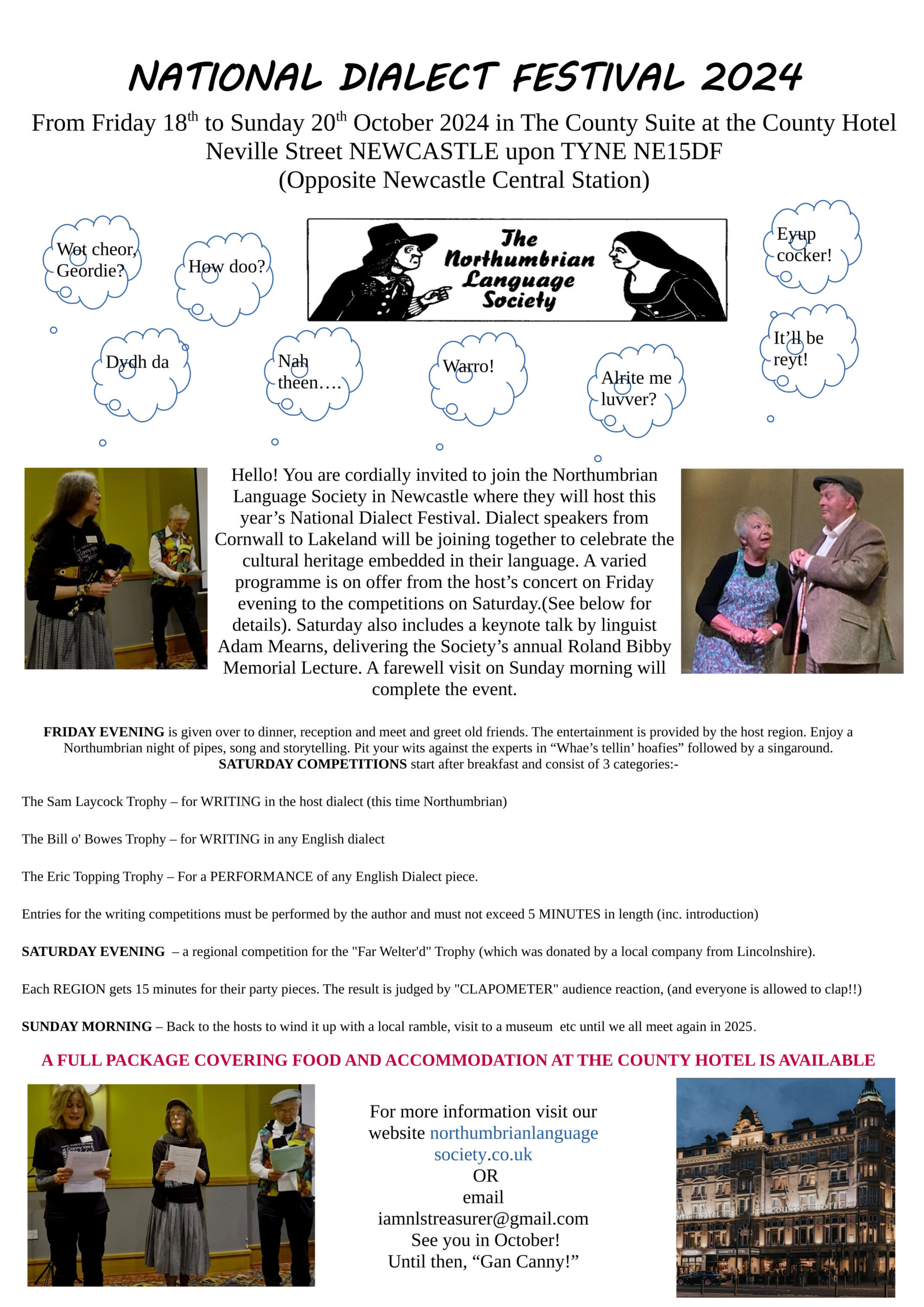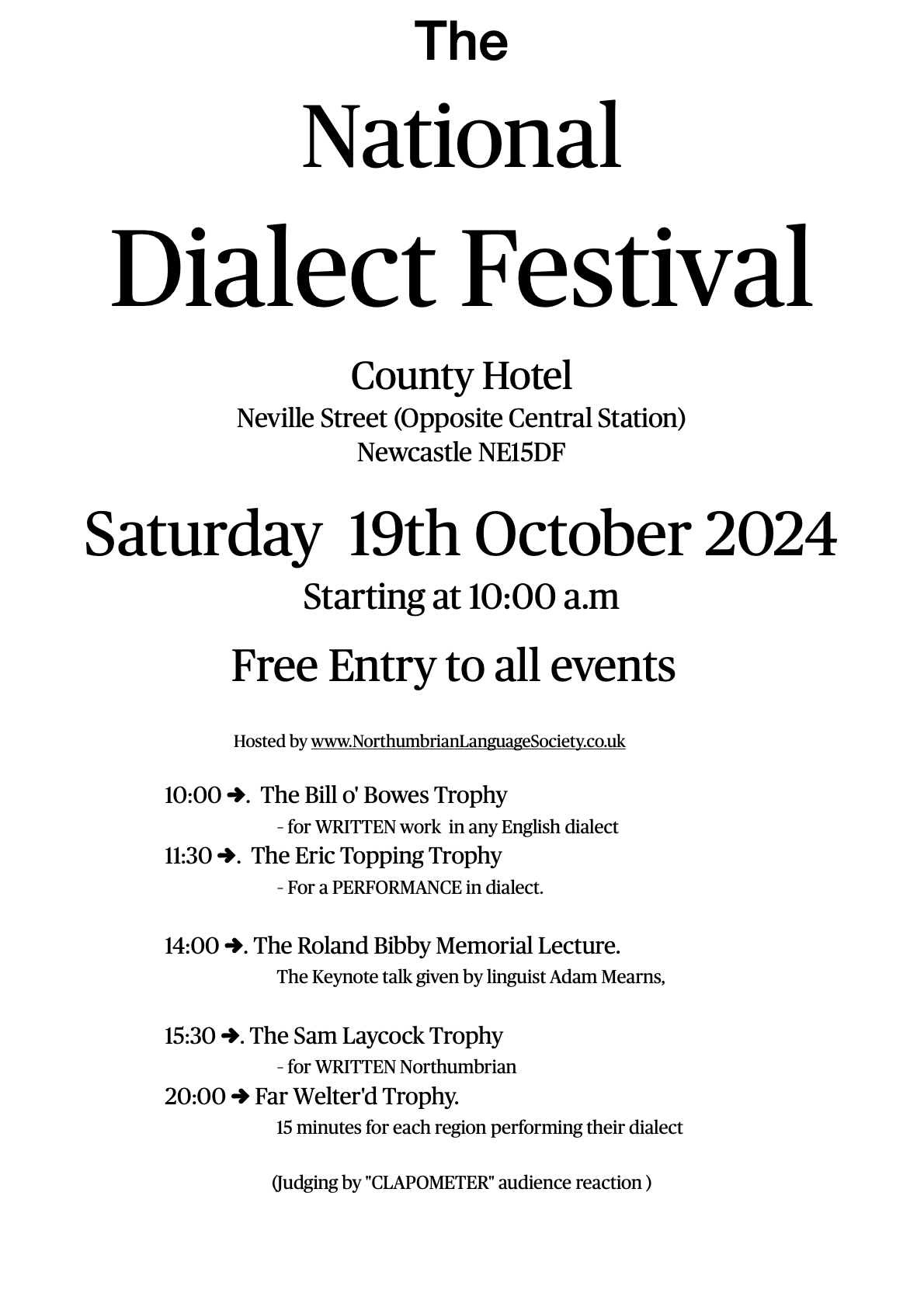Accents only come to life when you listen to them. Here are some examples.
Click Here to go to the videos page and SEE it being spoken.
Or if you want some practice, consult some written Northumbrian here.
Since the era of Dr Johnson, there has been a steady interest amongst historians and academics in the origins and evolution of language. On our own history pages we have provided a very brief overview of how Northumbrian originated, where its traits came from, and how it has evolved to what we have today.
- British Library recordings
- Wark
- Simey Telfer, (b. 1889, male, shepherd)
Simey recounts the story of a murder of an old shopkeeper in Elsdon 150 years previously and of the subsequent pursuit and eventual hanging of the culprit. At the time of the recording the gallows still stood on the site of the execution. Elsdon is a village some distance northeast of Wark; Billsmoor is the moorland just north of Elsdon; Whitlees the woodland just to the east; The Ray is short for Raylees, a hill just south of Elsdon and Throckley is a village to the west of Newcastle-upon-Tyne. - Allendale
George Sparks, (b.1898, male, lead miner and farmer) - George discusses changes in the nature of farming locally. He explains how numerous former smallholdings under individual ownership have been merged into single farms, and he laments the subsequent loss of traditional practices, particularly the use of middens. Byerhope Farm is south of Allendale Common on the hills above Allenheads.
- Embleton
- W. Pitt, (b.1883, male, retired farmworker/baker/baker’s waggoner)
- Mr Pitt recalls the shipwreck of the Ballycotton on Embleton Rocks, notes the importance of the introduction of radar for shipping and refers with pride to a Craster speciality: Robson’s kippers.
- Whe’s Tellin Hoafies?
- A round of this amusing game is a popular item in some of the Society’s events
- if you enjoyed that – try the next one.
- And more hoafies here
- Raymond Reed
Reciting at the 50th Northumbrian gathering in 2017 - Peter Arnold
Reciting his hoafy tale at the Northumbrian Gathering in April 2017
Heddon-on-the-Wall 1953
How to make a cartwheel
Thomas Mosscrop, (b.1879, male, retired joiner)
Thomas describes in intricate detail the making of a cartwheel. The speaker’s grandchild enters and is addressed briefly during the course of the recording.
Uswayford, Alwinton
Neil Telfer, (b.1935/08/15, male, quarry manager)
Neil remembers the isolation of the family farm he grew up on in Uswayford on the fells above Alwinton. He describes how provisions were delivered to such a remote location and the measures taken to prepare for the possibility of being cut off in winter. He speaks admiringly of his mother cooking for such a large household. Windyhaugh is a hamlet in the Usway valley and Wooler a town to the northeast.
Our own Peter Arnold won a trophy in 2013 from the national dialect festival for this item, which was reported on ITV News.
The copyright and rights of the original owners and participants are acknowledged.
Share this content


Trying to find an interview with my grandfather made in the “60”s
Frederick William
Hutchinson.
Born at Allenheads,
Northumberland and
lived there all of his life.
Please can you help?
Regards
Ian
Hello Ian,
Apologies for the delayed reply to your enquiry. It sounds from the date as though your grandfather took part in the English Dialect survey, originated by Professor Orton, based at Leeds University. I understand that studies are still taking place about the many recordings made by that initiative. I fact, it was only earlier this week that I discovered the following link to the current repository
https://explore.library.leeds.ac.uk/special-collections-explore/409248/leeds_archive_of_vernacular_culture_survey_of_en
If you were to make further enquiries at Leeds, I feel pretty sure you could track the original recording down. We’d be very interested in any recollection you may have of when the recorders came to visit, and of course whatever the outcome of your enquiries may be.
Bonne Chance!
Hallo, wonderful collection of material here. I’d really like to be able to listen to the audio recordings, but the links – none of them work. I recognise some of the interviews from those I’ve listened to at the British Library – just trying to see if I can listen to them from the comfort of my own sofa!
Hello,
Links to the BL archive are still not working, though I heard today from the curator that there are hopes access will be available in May. It all follows the digital break-in they suffered